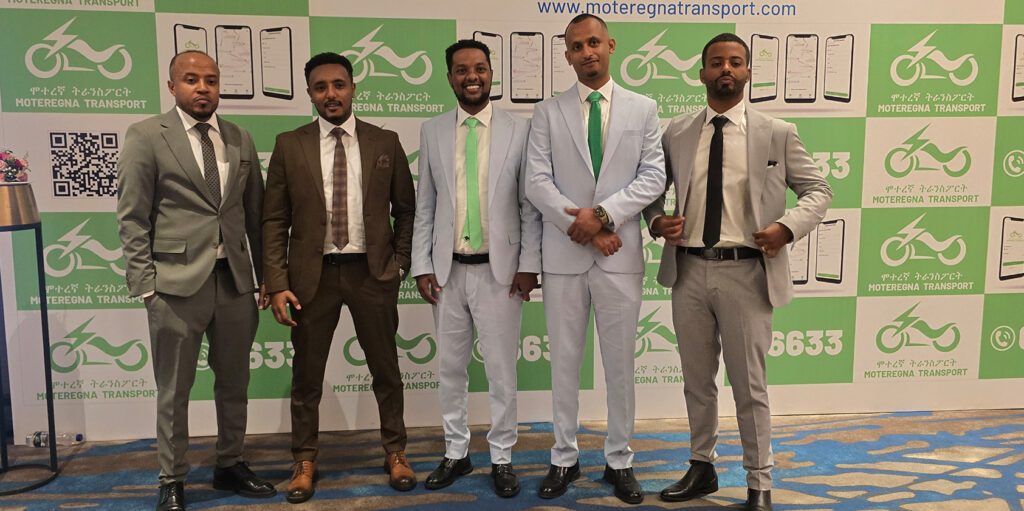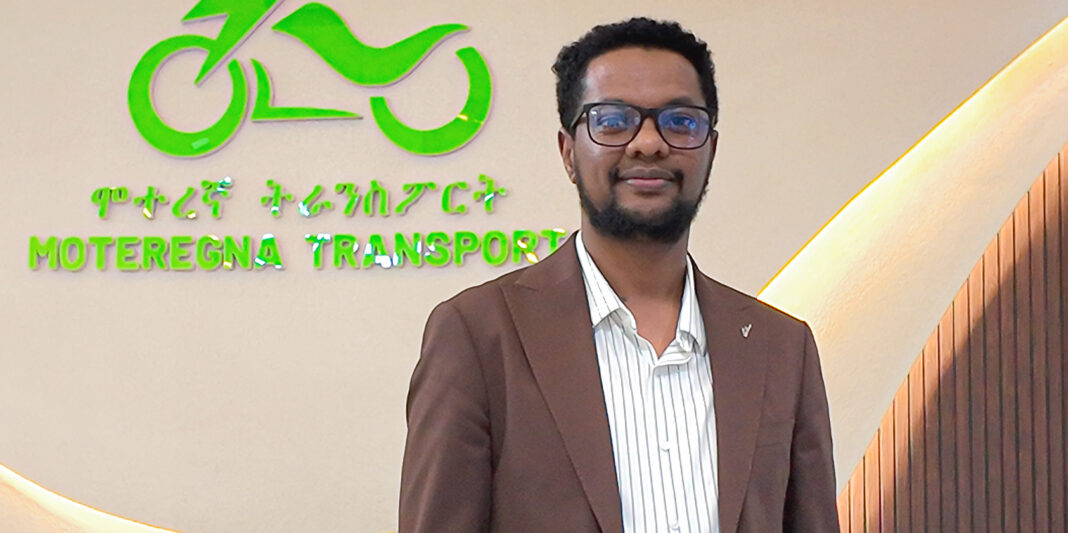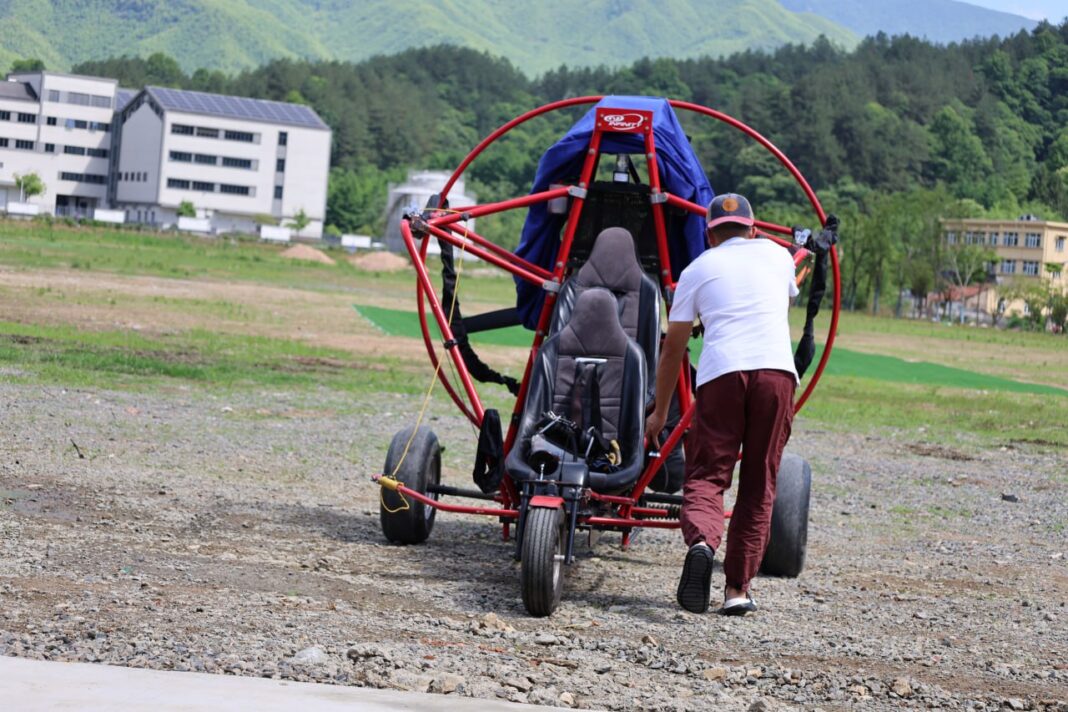Mesfin Getahun, Founder and CEO of Moteregna Transport, is steering Ethiopia’s logistics sector toward sustainability with innovative motorcycle delivery services and cutting-edge electric motor assembly. Drawing on a rich multidisciplinary academic background and a decade of executive experience in international organizations and logistics, Getahun’s vision aligns Moteregna with Ethiopia’s Green Growth Strategy through digital optimization and electric mobility. In this exclusive interview, Getahun shares insight into how Moteregna is overcoming operational challenges, fostering trust, and positioning itself as a leader in eco-friendly delivery solutions in Ethiopia.
Capital: How would you ensure Moteregna’s operations maximize their contribution to Ethiopia’s Green Growth Strategy?
Mesfien Getahun: Our business model aligns well with the Green Growth Strategy, as we specialize in motorbike delivery, which uses significantly less fuel than larger vehicles. In addition to this efficiency, we are assembling high-standard electric motors for our fleet, which reduces emissions and reliance on fossil fuels. We utilize digital tools to optimize routes, maintain our fleet for maximum efficiency, and train our riders in eco-driving practices. By integrating electric mobility and green logistics, we contribute to a cleaner, more sustainable Ethiopia while maintaining operational excellence.
We actively monitor and measure our environmental impact by tracking fuel savings, emission reductions, and the increasing share of electric vehicles in our fleet. We also seek partnerships with local suppliers and manufacturers to source sustainable materials and parts, further minimizing our ecological footprint. Through public awareness campaigns and client engagement, we encourage businesses and individuals to adopt green delivery solutions, creating a ripple effect that supports Ethiopia’s national sustainability objectives.
Capital: How would you work with the Trade and Revenue Office to establish a “conducive platform for taxation” and gather real income data?
Mesfien: A sustainable logistics industry requires transparency. At Moteregna, we are dedicated to building a digital taxation ecosystem where every transaction is recorded and easily verifiable. We envision creating a shared platform with the Trade and Revenue Office that integrates data directly from our system, ensuring compliance and trust.
Moreover, we maintain open dialogue with authorities to ensure that the taxation framework reflects the realities of digital businesses. This approach builds confidence with regulators and helps set standards for the broader logistics industry.
Additionally, we plan to incorporate real-time reporting and analytics that allow regulators to efficiently monitor trends and patterns, reducing administrative burdens while improving accuracy. By providing training and support for government staff on utilizing these digital tools, we aim to create a collaborative and sustainable taxation ecosystem.
This strategy not only strengthens Moteregna’s compliance but also promotes transparency across the logistics sector, fostering a culture of accountability and trust nationwide.
Capital: Given the “high risk of loss or damages,” what strategy would you propose to address the absence of carrier liability coverage?
Mesfien: The lack of carrier liability insurance in Ethiopia poses a challenge, which we address through layered solutions. First, we establish a risk reserve fund to cover unexpected incidents. Second, we implement rigorous safety and handling protocols for our riders and cargo. Third, we are collaborating with insurers to design partial coverage packages for high-value routes. Strong contract terms and clearly defined responsibilities with clients further protect all parties involved. By combining prevention, financial preparedness, and partnerships, Moteregna can operate safely while working towards comprehensive liability coverage. We continuously train our riders on risk awareness, accident prevention, and emergency response, ensuring they are well-equipped to handle unexpected situations.
We also utilize digital tracking and monitoring systems to identify potential risks in real-time and respond promptly. By integrating technology with proactive safety measures, financial planning, and strategic partnerships, Moteregna not only safeguards its operations but also builds trust with clients, ensuring their confidence in our ability to deliver reliably under all circumstances.
Capital: What are the key implications for Moteregna of the “tremendous rising of fuel costs” for competitors, and how can we capitalize on it?
Mesfin: Fuel price increases significantly affect larger vehicle operators. Moteregna’s motorbike model is much more fuel-efficient, and our transition to electric motors further reduces our fuel dependency, giving us a cost advantage. While our competitors struggle with rising costs, we continue to offer affordable and reliable delivery. Our investments in route optimization and electric mobility enhance our competitive edge, allowing Moteregna to increase market share even during periods of fuel volatility.
Our commitment to operational efficiency and predictive planning enables us to quickly adapt to market fluctuations, ensuring uninterrupted service for our clients. By utilizing data analytics to monitor fuel trends and delivery performance, we can identify the most cost-effective routes while maintaining high reliability.
This combination of efficiency, technology, and sustainable practices positions Moteregna not only to withstand rising fuel costs but also to seize opportunities where competitors face operational challenges, expanding our reach and reinforcing our market leadership.
Capital: How would you build and maintain the necessary trust to ensure clients and corporations effectively use Moteregna’s services?
Mesfin: Trust is the most valuable currency in logistics. We consistently deliver on time, provide clients with real-time tracking, and safeguard sensitive data with robust systems. For corporate clients, we assign dedicated account managers and maintain open feedback channels.
By consistently demonstrating accountability, transparency, and operational excellence, Moteregna establishes itself as a trusted partner for both individuals and businesses.
We focus on building long-term relationships by offering personalized solutions, anticipating client needs, and swiftly addressing any issues that arise. Our customer education initiatives inform clients about the benefits of our electric motorbike fleet and sustainable delivery practices, further reinforcing their confidence in our services.
By combining reliability, transparency, innovation, and proactive engagement, Moteregna not only maintains trust but also strengthens loyalty, ensuring that clients repeatedly choose our services and recommend us to others.

Capital: Moteregna is currently in its bike production phase; what are the three most critical operational challenges you foresee in scaling the service to achieve its vision of becoming Ethiopia’s leading provider?
Mesfin: Scaling our business comes with challenges, especially as we manufacture high-quality electric motors. The three most critical areas are:
Maintaining Quality at Scale: Ensuring every motorbike meets safety and durability standards, particularly for electric models. We are implementing strict quality control processes, rigorous testing protocols, and continuous monitoring to ensure consistency across all units as production increases.
Building Infrastructure: Expanding maintenance hubs, spare parts distribution, and battery charging capabilities.
Beyond physical infrastructure, we are also developing digital systems to track maintenance schedules, battery health, and inventory, ensuring our service network operates efficiently and reliably.
Human Capital: Recruiting and training skilled riders, mechanics, and supervisors to support a growing fleet. We are creating structured training programs focused on safety, electric motor technology, customer service, and operational excellence, ensuring our team develops in competence alongside the company.
Successfully addressing these areas will allow Moteregna to scale responsibly, maintain high customer trust, and ensure that operational expansion does not compromise service quality or reliability.
Capital: In what ways can a logistics company like Moteregna provide “Customer-Centric Service” beyond just fast delivery?
Mesfin: Customer-centricity involves understanding and anticipating client needs. In addition to speed, we provide end-to-end visibility, flexible delivery options, and responsive support. For businesses, we offer tailored solutions and data insights. Our commitment to green delivery using electric motorbikes allows clients to align their logistics with sustainability goals, creating added value beyond mere delivery.
We actively collect and analyze customer feedback to continuously improve our services and anticipate future needs. We also provide customized reporting and performance metrics for corporate clients, enabling them to make informed logistics decisions.
By combining speed, reliability, transparency, sustainability, and proactive engagement, Moteregna ensures that every delivery experience is efficient, safe, and aligned with the client’s broader business objectives, fostering long-term partnerships and loyalty.
Capital: What is the biggest regulatory challenge?
Mesfin: The most significant regulatory challenge is the absence of standardized policies for motorbike logistics, especially concerning taxation, licensing, and liability coverage. As the industry evolves, this creates uncertainty. At Moteregna, we proactively engage with regulators, share operational data, and demonstrate how our model supports job creation, tax transparency, and Ethiopia’s Green Growth Strategy.
Through these efforts, we help shape regulations that foster both innovation and compliance. We also collaborate with stakeholders, including businesses and community organizations, to advocate for policies that promote sustainable growth, safety standards, and fair competition.
This proactive approach ensures that Moteregna not only adapts to regulatory changes but also contributes to creating a predictable and supportive environment for the entire logistics sector in Ethiopia.
Capital: Where do you see Moteregna in five years, and how will your role directly contribute to achieving that vision?
Mesfin: In five years, Moteregna will be Ethiopia’s leading motorbike-based delivery company, with operations expanded across all regions of the country. We will be recognized for our innovation, reliability, and green delivery powered by high-standard electric motorbikes. As CEO, my role is to drive this growth responsibly, secure strategic partnerships, scale our fleet, and cultivate talent.
Our vision is to connect businesses and individuals nationwide while contributing to Ethiopia’s sustainable development.
We plan to invest in advanced digital systems to optimize fleet management, delivery routes, and customer engagement across all regions.
We will also expand our training programs to ensure that riders, mechanics, and support staff uphold the highest standards of safety, efficiency, and customer service.
By fostering a culture of innovation, sustainability, and operational excellence, Moteregna aims not only to lead the market but also to set a benchmark for green logistics in Ethiopia, empowering communities and businesses to thrive while minimizing environmental impact.







